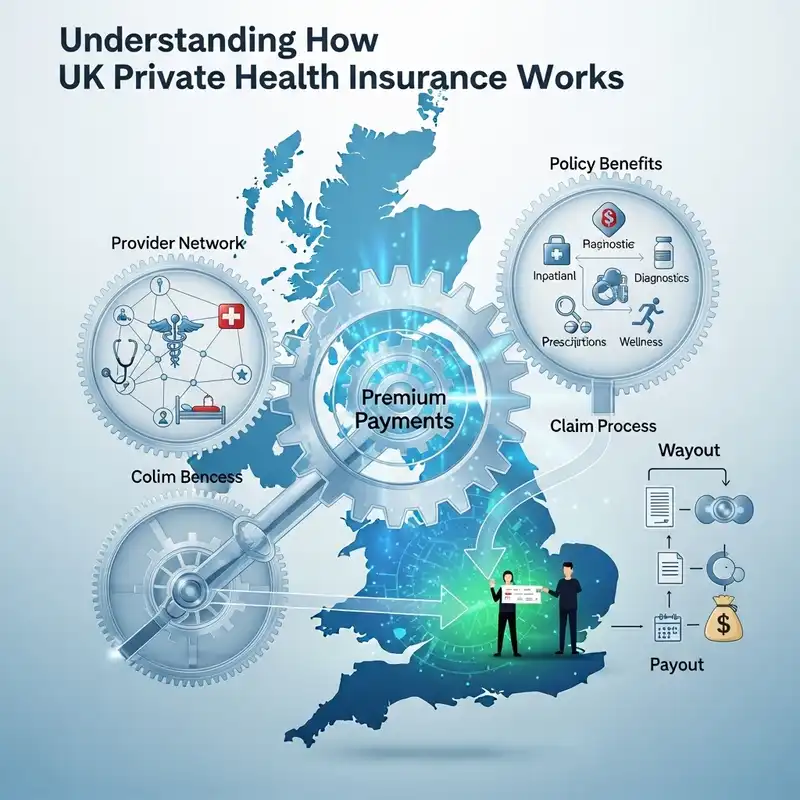TL;DR
In an increasingly complex world, managing our health has become more critical than ever. The traditional view of healthcare often revolves around reactive treatment – waiting until we're ill to seek help. However, a significant shift is underway, one that prioritises prevention, understanding, and proactive well-being.
Key takeaways
- Why a certain lifestyle choice impacts your health.
- Why a particular medication works the way it does.
- Why certain preventative measures are crucial for your specific risk profile.
- Unbiased Advice: We are not tied to any single insurer. Our loyalty is solely to you, our client. This allows us to provide unbiased, transparent advice on policies from all major UK health insurance providers. We'll explain the pros and cons of each, highlight key differences, and clarify any jargon.
- Tailored Solutions: We take the time to understand your unique circumstances, health priorities, and budget. Whether you're looking for comprehensive cover for your family, specific mental health support, or a plan focused on preventative care, we'll identify the policies that best fit your requirements.
Beyond Access to Knowledge: How UK Private Health Insurance Fosters Deep Health Literacy for Proactive Well-being
In an increasingly complex world, managing our health has become more critical than ever. The traditional view of healthcare often revolves around reactive treatment – waiting until we're ill to seek help. However, a significant shift is underway, one that prioritises prevention, understanding, and proactive well-being. This shift is deeply intertwined with the concept of "health literacy," which is far more than just knowing basic health facts. It's about having the skills, confidence, and understanding to navigate the healthcare system, make informed decisions, and actively manage one's health throughout life.
While the National Health Service (NHS) remains the bedrock of UK healthcare, offering universal access to essential services, its inherent challenges – such as burgeoning waiting lists and a focus on acute care – often limit the scope for individuals to engage deeply and proactively with their health. This is where UK private health insurance (PMI) steps in, not as a replacement for the NHS, but as a powerful complement. Beyond merely offering faster access to diagnosis and treatment, PMI is emerging as a critical tool for cultivating deep health literacy, empowering individuals to take genuine ownership of their well-being journey. This comprehensive guide will explore how private medical insurance fosters a profound understanding of health, enabling a truly proactive and preventative approach to life.
The Shifting Paradigm: From Reactive to Proactive Health
For decades, the public perception of healthcare has largely been reactive. A cough becomes persistent, a pain flares up, or a symptom appears, prompting a GP visit and subsequent medical intervention. While this model is essential for acute illness and emergencies, it often overlooks the immense value of prevention, early intervention, and continuous health management. The NHS, despite its incredible strengths and dedicated professionals, often operates under immense pressure, forcing a focus on managing immediate crises rather than nurturing long-term health understanding.
The limitations of a solely reactive approach are becoming increasingly apparent. Long waiting times for specialist consultations, diagnostic tests, and elective procedures can lead to increased anxiety, delayed treatment, and potentially poorer outcomes. More importantly, they can deter individuals from seeking early advice or engaging in preventative measures. This environment often leaves individuals feeling like passive recipients of care rather than active participants in their health.
Private health insurance offers a different paradigm. It encourages a proactive stance by providing direct, swift access to a broader range of services and information. This isn't just about jumping queues; it's about fostering an environment where individuals can:
- Seek early advice: Addressing concerns before they escalate.
- Access preventative measures: Utilising screenings and health checks.
- Understand their health holistically: Moving beyond symptoms to underlying causes and lifestyle impacts.
- Engage with specialists: Gaining diverse perspectives and comprehensive insights.
By shifting the focus from illness management to health optimisation, PMI empowers individuals to become more informed, engaged, and ultimately, healthier. It complements the NHS by alleviating some pressure on its services while providing a valuable alternative for those who seek greater control and personalisation in their health journey.
Beyond Expedited Care: The Pillars of Health Literacy Fostered by PMI
While quicker access to consultants and treatments is a significant benefit of private health insurance, its true value in fostering health literacy lies much deeper. PMI plans are increasingly designed to provide a suite of tools, services, and opportunities that educate, inform, and empower policyholders.
Faster, Direct Access to Specialists and Diagnostics
One of the most immediate and tangible benefits of private health insurance is the ability to bypass NHS waiting lists for specialist consultations and diagnostic tests. This swift access is not merely a convenience; it is a critical enabler of health literacy.
- Timely Information: When you can see a specialist quickly after a referral, you receive a diagnosis sooner. This reduces the period of uncertainty and anxiety, allowing you to understand your condition and treatment options without undue delay.
- In-depth Consultation: Private consultations often allow for longer, more detailed discussions with specialists. This provides ample opportunity to ask questions, explore concerns, and gain a thorough understanding of a diagnosis, prognosis, and potential treatments. This deeper engagement is foundational to building health literacy.
- Reduced Anxiety and Improved Understanding: Lingering uncertainty about symptoms or a diagnosis can be incredibly stressful. Rapid access to accurate information and expert opinions alleviates this anxiety, enabling clearer thinking and better comprehension of one's health status. It transforms a nebulous worry into a concrete understanding, which is the first step towards informed decision-making.
Comprehensive Health Assessments and Screenings
Many private health insurance policies, especially more comprehensive ones, include or offer discounted access to annual health assessments and preventative screenings. These are pivotal for fostering deep health literacy.
- Early Detection: Regular screenings (e.g., for certain cancers, cardiovascular conditions, diabetes) can identify health issues at an early, more treatable stage, often before symptoms even appear. Understanding these screening results and their implications for your personal risk profile is a cornerstone of proactive health management.
- Personalised Risk Assessment: These assessments go beyond basic checks. They often include detailed blood tests, physiological measurements, and lifestyle questionnaires that help you and your medical team understand your specific health risks based on genetics, lifestyle, and medical history.
- Educational Insights: During these assessments, medical professionals can explain the significance of various health markers (e.g., cholesterol levels, blood pressure, BMI) and how lifestyle choices impact them. This one-on-one education is invaluable for developing a nuanced understanding of your body and its needs. For example, a discussion about elevated blood pressure can lead to an understanding of dietary changes, exercise benefits, and the importance of regular monitoring, rather than just being told to take medication.
Access to a Wider Range of Information and Second Opinions
Private health insurance often provides the freedom and flexibility to seek multiple perspectives on a diagnosis or treatment plan.
- Empowerment Through Choice: The ability to consult different specialists means you are not limited to a single opinion. This empowers you to compare information, weigh up options, and ultimately feel more confident in the decisions you make about your health.
- Diverse Expertise: Different specialists may have varying approaches or areas of sub-specialisation. Seeking a second opinion can uncover alternative treatment pathways, clarify complex diagnoses, or provide additional insights that deepen your understanding.
- Informed Decision-Making: Armed with comprehensive information from multiple reputable sources, you are better equipped to engage in shared decision-making with your medical team, understanding the pros and cons of each path. This process is central to developing advanced health literacy.
Digital Health Tools and Resources
The digital revolution has profoundly impacted healthcare, and private insurers are at the forefront of leveraging technology to enhance health literacy.
- Virtual GP Services: Many policies now include 24/7 access to online GPs, allowing for quick, convenient consultations from anywhere. This ease of access encourages individuals to seek early advice for minor ailments, rather than waiting, and provides immediate information regarding symptoms.
- Health and Wellness Apps: Insurers often partner with or develop their own apps that provide a wealth of information. These can include:
- Symptom Checkers: Guiding users on potential causes and when to seek professional help.
- Health Trackers: Monitoring activity, sleep, diet, and biometric data, helping individuals understand the direct impact of their habits on their health.
- Personalised Health Insights: Delivering bespoke advice based on tracked data and personal health profiles.
- Online Portals: Secure online platforms provide access to medical records, test results, appointment scheduling, and educational content tailored to individual health needs. This direct access to personal health data is vital for self-management and understanding.
- Mental Health Support Platforms: Digital platforms connecting individuals with online therapy, counselling, and mindfulness resources can significantly improve mental health literacy by demystifying conditions and providing accessible support.
Personalised Wellness Programmes and Preventative Care
Many private health insurance providers actively promote preventative care and healthy living through various wellness programmes and incentives. These programmes are designed to educate and motivate policyholders to adopt healthier lifestyles.
- Gym Memberships & Fitness Incentives: Discounts or rewards for gym memberships, fitness trackers, and active lifestyles (e.g., Vitality's points system) encourage physical activity, which is fundamental to long-term health. Understanding how exercise impacts cardiovascular health, mood, and weight management is part of this education.
- Nutrition Advice and Support: Access to registered dieticians or online nutrition programmes helps individuals understand the link between diet and health, how to manage conditions through food, and the principles of balanced eating.
- Stress Management and Mindfulness: Programmes focused on stress reduction techniques, mindfulness, and mental resilience equip individuals with coping mechanisms and a deeper understanding of the mind-body connection.
- Smoking Cessation & Alcohol Awareness: Support and resources for quitting smoking or moderating alcohol intake are often provided, accompanied by educational materials on the health risks associated with these habits.
These programmes go beyond simple advice; they provide actionable strategies and continuous support, making the journey towards better health more engaging and sustainable. They transform theoretical knowledge into practical, daily habits.
Mental Health Support and Awareness
Mental health is an integral part of overall well-being, and private health insurance has significantly broadened its coverage and support in this area. This inclusion is crucial for fostering mental health literacy.
- Access to Therapies: Policies often cover a range of talking therapies, including psychotherapy, cognitive behavioural therapy (CBT), and counselling, without the long waiting lists often associated with NHS services like IAPT.
- Breaking Down Stigma: The availability of private mental health support normalises seeking help and encourages open discussion about mental well-being, reducing the stigma often associated with mental health conditions.
- Understanding Conditions: Access to qualified mental health professionals allows individuals to gain a clear diagnosis and understanding of conditions like anxiety, depression, or stress-related disorders. This education is vital for effective management and recovery.
- Holistic Approach: Many insurers integrate mental health support with physical health services, emphasising the interconnectedness of mind and body. This fosters a holistic view of health literacy.
Empowering Informed Decision-Making
Perhaps the most profound way private health insurance fosters deep health literacy is by empowering policyholders to become active, informed decision-makers in their own care.
- Understanding Treatment Options: When faced with a diagnosis, private care often presents a clearer picture of all available treatment pathways, including their risks, benefits, success rates, and potential side effects. This detailed information allows for a truly informed choice.
- Collaborative Care: The private healthcare model often facilitates a more collaborative relationship between patient and clinician. There's greater scope for dialogue, for patients to express their preferences, and for shared decision-making, where the patient's values and goals are considered alongside clinical expertise.
- Reduced Reliance on 'Doctor Knows Best': While respecting medical authority, private insurance encourages a shift from passively accepting medical advice to actively questioning, understanding, and participating in one's treatment plan. This level of engagement builds confidence and critical thinking skills related to health.
How Private Health Insurance Fosters "Deep" Health Literacy
Deep health literacy goes beyond simply understanding medical terms or being able to read a prescription. It involves a sophisticated comprehension of one's body, health risks, and the healthcare system, leading to sustained behavioural change and proactive health management. Private health insurance cultivates this deeper understanding through several mechanisms:
Understanding the 'Why' Not Just the 'What'
When you have extended consultations with specialists, access to comprehensive diagnostic reports, and tailored wellness programmes, you move beyond merely knowing what your condition is or what treatment you need. You start to understand the why:
- Why a certain lifestyle choice impacts your health.
- Why a particular medication works the way it does.
- Why certain preventative measures are crucial for your specific risk profile. This deeper understanding fosters a sense of agency and enables more effective long-term health management.
Longitudinal Engagement
PMI encourages ongoing relationships with health providers rather than episodic care.
- Regular Health Checks: Annual health assessments facilitate continuous monitoring and discussions about health trends over time.
- Wellness Programme Continuity: Engaging with wellness apps or lifestyle coaches over months builds habits and sustained knowledge. This continuous engagement means individuals are consistently learning about their health, rather than only during periods of acute illness.
Personalised Health Journeys
Private health insurance allows for a more tailored approach to health.
- Bespoke Treatment Plans: Based on detailed diagnostics and specialist consultations, treatments can be highly individualised.
- Customised Wellness Programmes: Recommendations for diet, exercise, and stress management are often tailored to personal data and goals. This personalisation ensures that the health information received is directly relevant and actionable, increasing its impact and retention.
Navigating the Healthcare System with Confidence
For many, the healthcare system can be a daunting maze. PMI provides a clearer, more streamlined path.
- Defined Pathways: Private care often has clearer referral pathways and quicker booking processes, reducing confusion and frustration.
- Support Services: Many insurers offer helplines or claims teams that guide policyholders through the process, from understanding their policy benefits to arranging appointments. This reduces the mental load and administrative burden, allowing individuals to focus on understanding their health rather than navigating bureaucracy.
Behavioural Nudges and Incentives
Leading private insurers actively use behavioural economics to encourage healthier habits.
- Rewards for Healthy Choices: Discounts on healthy food, gym memberships, or even travel, often tied to achieving health goals (e.g., step targets, health checks), create positive reinforcement.
- Gamification: Turning health goals into challenges or games can make preventative health more engaging and sustainable. These nudges translate abstract health knowledge into tangible, rewarded actions, embedding health literacy into daily behaviour.
Focus on Prevention over Cure
Ultimately, deep health literacy is about prevention. PMI’s emphasis on screenings, wellness programmes, and early intervention shifts the mindset from reacting to illness to proactively maintaining health. This preventative focus is the hallmark of true health literacy, enabling individuals to make choices today that will safeguard their well-being tomorrow.
Real-Life Examples and Case Studies
To truly appreciate the impact of private health insurance on health literacy, let's look at some illustrative scenarios:
Case Study 1: The Busy Professional – Sarah, 42
Sarah, a marketing manager, consistently felt tired and overwhelmed. She attributed it to her demanding job and raising two young children. While she often felt stressed, she rarely prioritised her own health. Her private health insurance policy, provided by her employer, included an annual health assessment and mental health support.
- Before PMI: Sarah would have likely soldiered on, perhaps eventually seeing an NHS GP when her symptoms became debilitating, facing potential waiting lists for stress-related therapies. Her understanding of her condition would have been limited to "burnout."
- With PMI: Sarah used her virtual GP service to discuss her persistent fatigue and anxiety. The GP, after an initial consultation, suggested she utilise her health assessment. The assessment revealed borderline high blood pressure and significant stress markers. Crucially, the accompanying consultation with a health coach educated her on the physiological impacts of chronic stress and the importance of sleep and nutrition. Her policy also allowed direct access to a therapist, who helped her understand the cognitive patterns contributing to her anxiety and taught her practical coping mechanisms. She joined a discounted gym programme through her insurer and found that regular exercise significantly improved her energy levels and mood.
- Health Literacy Gained: Sarah gained a deep understanding of the physiological and psychological impact of stress, the interconnectedness of diet, exercise, and mental well-being, and how to proactively manage her health to prevent future issues, rather than just reacting to symptoms. She learned to recognise early warning signs and developed effective strategies for self-care.
Case Study 2: The Family Unit – The Thompsons, with Leo (6)
Leo, the Thompson’s son, developed a persistent cough and wheeze. The Thompsons were worried and had heard about long waiting times for paediatric specialists on the NHS. Their private family health insurance proved invaluable.
- Before PMI: The Thompsons would have seen their GP and likely faced a significant wait for a paediatric respiratory specialist, causing considerable anxiety and delaying a precise diagnosis. Their understanding of Leo's condition would have been limited to the GP's initial assessment.
- With PMI: Through their policy, they secured an appointment with a leading paediatrician within days. The specialist conducted thorough tests and diagnosed Leo with early-onset asthma. Critically, the consultant spent considerable time explaining asthma, its triggers, how to use Leo's inhalers effectively, and how to create a supportive home environment. The family also received access to educational resources via their insurer's app, including videos on managing childhood asthma and emergency protocols. They were also connected with a specialist asthma nurse for ongoing support and advice.
- Health Literacy Gained: The Thompsons moved from anxious parents to highly informed caregivers. They deeply understood Leo's condition, its management, and preventative measures. They learned how to confidently administer medication, identify triggers, and what to do in an asthma attack, significantly reducing their fear and empowering them to manage Leo's health effectively.
Case Study 3: The Health-Conscious Individual – David, 55
David was generally healthy but wanted to maintain his well-being as he aged. He proactively sought out private health insurance not just for illness cover, but for its preventative benefits.
- Before PMI: David might have relied on standard NHS checks, which are excellent for basic screening but less tailored or frequent than he desired. His understanding of his evolving health risks might have been limited.
- With PMI: David fully utilised his policy's annual advanced health assessment. This included detailed blood tests (e.g., advanced lipid profiles, diabetes markers), cardiovascular risk assessments, and a personalised consultation with a doctor who reviewed his genetic predispositions and lifestyle. Based on the findings, he received tailored advice on optimising his diet for heart health, fine-tuning his exercise regimen, and managing his sleep patterns. His insurer also offered discounts on specialist healthy cooking classes and a wearable fitness device that provided him with continuous feedback on his activity and sleep. He proactively engaged with the digital wellness tools, tracking his progress and adapting his routine based on the data.
- Health Literacy Gained: David developed a sophisticated understanding of his individual physiological markers and their implications for long-term health. He learned how to interpret his own health data, make precise lifestyle adjustments for optimal well-being, and became highly proficient in using technology to monitor and enhance his health, transforming from generally healthy to truly optimised.
These examples underscore that private health insurance is not just about a safety net for illness; it's a launchpad for profound health education and proactive self-management.
Navigating the Market: How WeCovr Helps
The UK private health insurance market can appear daunting at first glance. With numerous providers, a plethora of policy options, and varying levels of coverage, it's easy to feel overwhelmed. Each insurer has its own nuances, from network hospitals and outpatient limits to mental health provisions and wellness benefits. Understanding which policy genuinely aligns with your health goals, budget, and specific needs requires expertise and impartial advice.
This is where WeCovr comes in. As a modern UK health insurance broker, our core mission is to simplify this complex landscape for you. We act as your expert guide, navigating the intricacies of the market on your behalf.
- Unbiased Advice: We are not tied to any single insurer. Our loyalty is solely to you, our client. This allows us to provide unbiased, transparent advice on policies from all major UK health insurance providers. We'll explain the pros and cons of each, highlight key differences, and clarify any jargon.
- Tailored Solutions: We take the time to understand your unique circumstances, health priorities, and budget. Whether you're looking for comprehensive cover for your family, specific mental health support, or a plan focused on preventative care, we'll identify the policies that best fit your requirements.
- Saving You Time and Money: Comparing multiple quotes and understanding policy details can be incredibly time-consuming. We do the heavy lifting for you, presenting clear comparisons so you can make an informed decision without the hassle. Crucially, our service is at no cost to you. We are remunerated by the insurers, meaning you get expert guidance without paying a penny extra for your policy.
- Ongoing Support: Our relationship doesn't end once you've chosen a policy. We're here to assist with renewals, claims queries, or any adjustments you might need throughout the life of your policy.
At WeCovr, we believe that understanding your health insurance options is a key step towards achieving deep health literacy. We empower you to choose the best coverage, laying the groundwork for a more proactive and informed health journey.
Important Considerations and Limitations
While private health insurance offers considerable benefits for fostering health literacy and providing choice, it's vital to approach it with a clear understanding of its limitations, particularly regarding pre-existing and chronic conditions.
Pre-existing and Chronic Conditions
This is perhaps the most critical point to understand when considering private health insurance. In the vast majority of cases, UK private health insurance policies do not cover pre-existing medical conditions.
- Definition of Pre-existing: A pre-existing condition is typically defined as any disease, illness, or injury for which you have experienced symptoms, received medication, advice, or treatment before the start date of your insurance policy, whether or not it was formally diagnosed.
- Why They're Excluded: Insurers operate on a principle of risk pooling. If they covered conditions that individuals already had or were likely to develop, the costs would be prohibitive for everyone, and the system would be unsustainable.
- Chronic Conditions: Similarly, private health insurance is generally designed for acute, curable conditions, not for ongoing, long-term chronic conditions that require continuous management (e.g., diabetes, asthma, hypertension). While a policy might cover acute exacerbations or new, curable conditions that arise after the policy starts, the ongoing management and treatment of a pre-existing chronic condition will typically remain under the NHS.
It is absolutely crucial that prospective policyholders declare all past and current medical conditions during the application process. Failure to do so can lead to claims being rejected and the policy being invalidated. Always read the policy documents carefully to understand the specific terms and exclusions related to pre-existing conditions and chronic care.
Understanding Policy Exclusions and Waiting Periods
Beyond pre-existing conditions, policies will have other exclusions:
- Routine Maternity Care: This is typically not covered, though some policies might offer complications cover.
- Cosmetic Surgery: Procedures primarily for aesthetic purposes are usually excluded.
- Emergency Care: True emergencies should always be dealt with by the NHS. Private hospitals do not have A&E departments equipped for major trauma.
- Experimental Treatments: Unproven or experimental therapies are usually not covered.
- Waiting Periods: There are often initial waiting periods (e.g., 14 days for new conditions, 3-6 months for specific conditions like mental health or physiotherapy) before you can claim for certain benefits.
The Importance of Reading the Fine Print
Policy documents can be extensive and complex. It is paramount to:
- Understand Your Level of Cover: Are you covered for outpatient treatments? Are there limits on specialist fees? What is the excess you'll need to pay?
- Know Your Hospital Network: Many policies restrict you to a specific list of hospitals or offer different levels of cover depending on the hospital chosen.
- Clarify Any Ambiguities: If anything is unclear, ask your broker (like WeCovr) or the insurer for clarification before committing.
The Role of the NHS as the Foundation
It cannot be overstated that private health insurance is a complement to the NHS, not a replacement. The NHS remains the fundamental safety net for everyone in the UK, particularly for:
- Emergencies: For critical, life-threatening situations, the NHS's ambulance services and A&E departments are unparalleled.
- Chronic Condition Management: For the long-term management of conditions that are chronic or pre-existing, the NHS is the primary provider.
- Routine Care: For general practice appointments, vaccinations, and public health programmes, the NHS provides essential services.
Private health insurance provides choice, speed, and additional benefits, particularly around preventative care and early intervention for new, acute conditions. A balanced understanding of both systems is key to truly optimising your health journey.
The Economic and Societal Benefits of a Health-Literate Population
The benefits of deep health literacy, fostered in part by private health insurance, extend far beyond the individual policyholder. A healthier, more informed populace contributes significantly to the economic and societal well-being of the nation.
- Reduced Burden on Public Services: When individuals are more proactive about their health and able to access early intervention through private channels, it can alleviate some pressure on the NHS. Fewer people waiting for non-urgent specialist appointments, or being able to access diagnostic tests quickly, means NHS resources can be freed up for those who rely solely on public services or for acute emergencies. Early detection and management through private care can also prevent minor issues from escalating into major, costly public health crises.
- Increased Productivity in the Workforce: A health-literate workforce is a more productive one. When employees understand how to manage their stress, prevent illness, and access support quickly, they are less likely to experience prolonged periods of sickness absence. Quicker recovery from illness and better overall well-being translate into fewer sick days, higher morale, and improved output for businesses. Investment in employee private health insurance is often seen by businesses as an investment in their human capital, boosting productivity and retention.
- Improved Quality of Life for Individuals: Ultimately, the greatest benefit is the improved quality of life for individuals. Deep health literacy empowers people to live healthier, fuller, and more vibrant lives. It reduces anxiety about health concerns, fosters confidence in navigating medical decisions, and encourages behaviours that contribute to longevity and vitality. This ripple effect contributes to happier families and more engaged communities.
- A Healthier, More Resilient Society: When a significant portion of the population is health-literate, society as a whole becomes more resilient. Individuals are better equipped to respond to public health challenges, understand health directives, and make informed choices for themselves and their families. This collective understanding and proactive approach build a stronger, healthier nation, better prepared for future health challenges and enjoying a higher overall standard of living.
In essence, investing in private health insurance, particularly the aspects that promote health literacy, is an investment in human capital. It's about cultivating a society where individuals are not just living longer, but living better – with greater understanding, control, and enjoyment of their health.
Conclusion
The journey towards optimal health is not merely about surviving illness; it's about thriving through understanding, prevention, and proactive engagement. While the NHS provides an invaluable foundation, UK private health insurance offers a powerful pathway to cultivate deep health literacy, transforming individuals from passive recipients of care into empowered architects of their own well-being.
Beyond the undeniable convenience of faster access to specialists and diagnostics, PMI plans are increasingly designed to be comprehensive educational tools. They provide bespoke health assessments, integrate cutting-edge digital health resources, and incentivise preventative wellness programmes. They offer the freedom to seek diverse medical opinions and crucial, timely support for mental health, all of which contribute to a profound understanding of one's body, mind, and the healthcare landscape.
The ability to understand the 'why' behind health decisions, to engage in longitudinal health management, and to navigate the medical system with confidence are hallmarks of true health literacy. Private health insurance fosters this by providing the time, resources, and personalised attention often constrained in overburdened public systems.
It’s an investment not just in avoiding illness, but in embracing a life of proactive health management. For those looking to take greater control of their well-being, to delve deeper into understanding their unique health profile, and to access a wider array of preventative tools, UK private health insurance stands as a formidable ally.
If you're considering how private health insurance could benefit your health journey, remember that understanding your options is the first step. At WeCovr, we are dedicated to guiding you through the complexities, helping you find the perfect policy from leading insurers, all at no cost to you. Empower yourself with knowledge, and take the first step towards a more informed, proactive, and healthier future.
Sources
- NHS England: Waiting times and referral-to-treatment statistics.
- Office for National Statistics (ONS): Health, mortality, and workforce data.
- NICE: Clinical guidance and technology appraisals.
- Care Quality Commission (CQC): Provider quality and inspection reports.
- UK Health Security Agency (UKHSA): Public health surveillance reports.
- Association of British Insurers (ABI): Health and protection market publications.
































